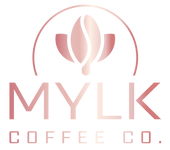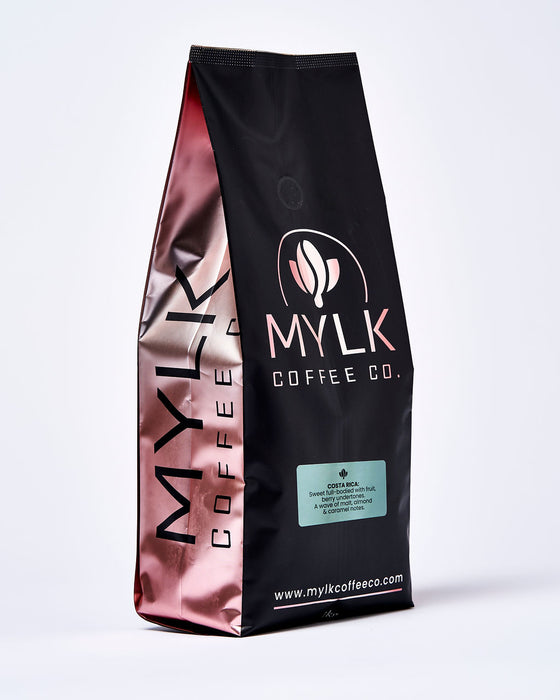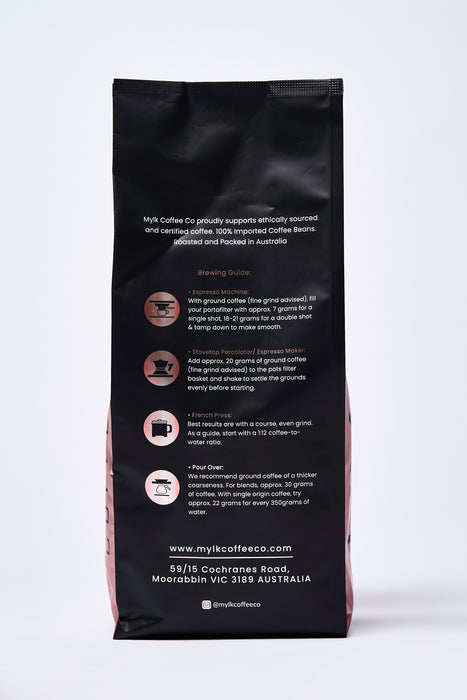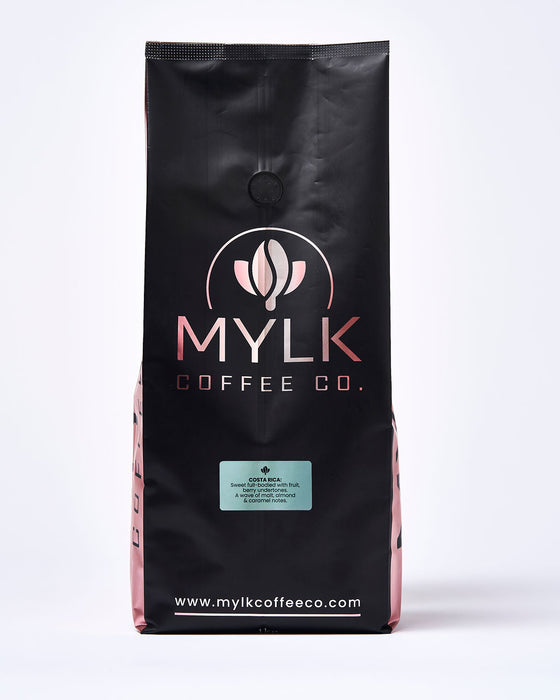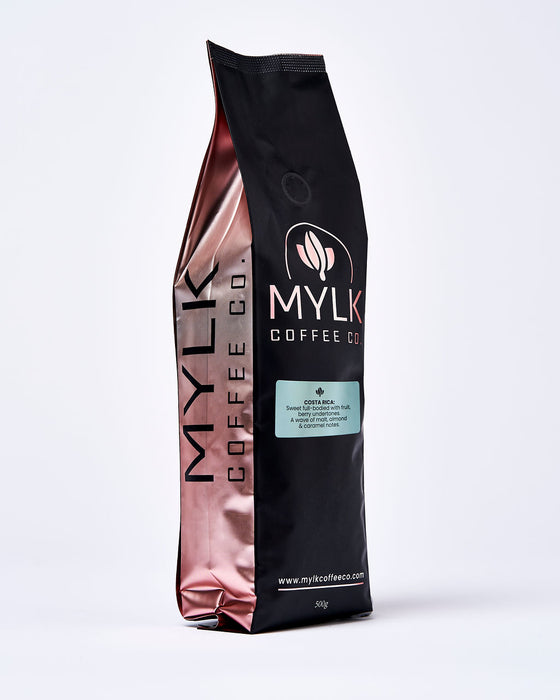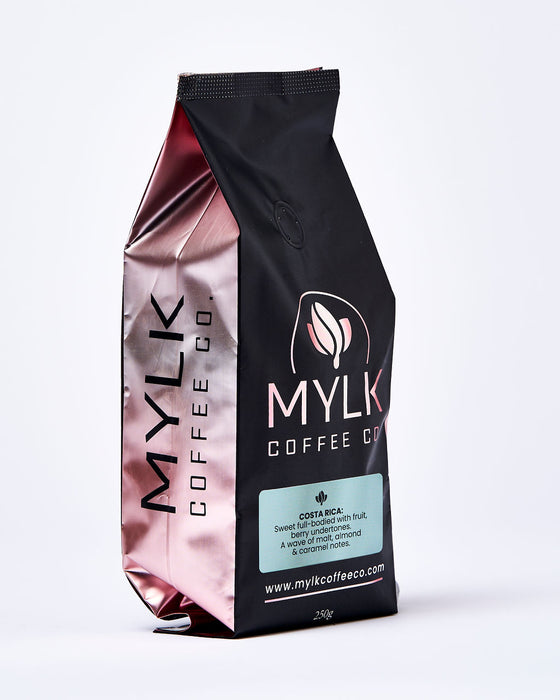
Costa Rican Coffee Beans RAINFOREST ALLIANCE
Our Costa Rican coffee beans, FULLY RAINFOREST ALLIANCE CERTIFIED and bears the Rainforest Alliance Certification, that invests in protecting precious rainforest resources. This Single origin has a rich, sweet full-bodied flavour with fruit and berry undertones. Complimenting these flavours are a wave of malt, almond, caramel and cherry notes. The brown sugary sweetness delivers a long-lasting taste which lingers on your palette.
RAINFOREST ALLIANCE CERTIFIED
REGION/AREA: Central Valley, COSTA RICA
COFFEE FARM: CoopeLibertad
PROCESS METHOD: Fully Washed
About Costa Rican Coffee Beans
Costa Rican coffee beans are widely considered to be among the finest in the world. This Central American country between the Caribbean Sea and the South Pacific Ocean has a long history of producing high-quality Arabica coffee, and its coffee beans are sought after by coffee lovers and professionals alike for their unique flavour profile and exceptional quality.
A key factor that sets Costa Rican coffee beans apart is the country's ideal tropical growing conditions. The rich volcanic soil, high altitudes, and perfect combination of sun and rain create an environment that is ideal for coffee cultivation. The coffee beans grown in Costa Rica are typically shade-grown, which results in a slower maturation process and a more complex flavour profile.
The flavour of Costa Rican coffee beans can vary depending on the region where they are grown. In general, however, these beans are known for their bright acidity and delicate sweetness, with hints of citrus and floral notes. MYLK's Costa Rican coffee beans feature fruit and berry undertones complimented by malt, almond, caramel and cherry notes. The flavour is often described as clean and bright, with a smooth finish.
Costa Rican coffee beans are typically roasted to a medium-light to medium-dark level to preserve their delicate flavours and aromas. They are versatile and can be brewed using a variety of methods, including drip, French press, and pour-over.
How to Serve
When it comes to serving Costa Rican coffee, it's best to enjoy it black or with just a splash of milk. The subtle flavours of the beans can be easily masked by sugar or other sweeteners, so it's best to avoid adding these to your coffee if you want to fully appreciate its unique and diverse flavour profile.
Summary
Costa Rican coffee beans are a top choice for coffee lovers who appreciate a delicate and complex flavour profile. Whether you're brewing at home or in a professional setting, these beans offer a smooth and satisfying cup of coffee that is sure to please. With their ideal growing conditions and dedication to quality, Costa Rican coffee producers have earned their reputation as some of the best in the world.
Home Brewing Guide
Espresso machine
With ground coffee (fine grind advised), fill your portafilter with approx. 7 grams for a single shot, and 18-21 grams for a double shot. Gently tamp down to make smooth and even.
Stovetop Percolator/ Espresso Maker
Add approximately 20 grams of ground coffee (fine grind advised) to the pot's filter basket and shake to settle the grounds evenly before starting. No need to tamp down hard when filling the basket.
French Press
Best results are with a course, even grind. As a guide, start with a 1:12 coffee-to-water ratio.
Pour Over
We recommend ground coffee of a thicker coarseness. For blends, approximately 30 grams of coffee. With single origin coffee, try approximately 22 grams for every 350 grams of water.
Grading, Cupping & Scores
Specialty Coffee often has references to coffee grading and coffee cupping scores.
How is Coffee Graded?
Coffee beans are graded to judge the relationship between coffee beans with imperfections and the resulting coffee’s quality. Coffee is rated on a scale of one to five based on the number of defects in the beans. Examples of primary defects include sour beans, a pod or cherry, or stones or sticks found in the batch. Secondary defects can include husk, broken or chipped beans, or damage as a result from insects.
Grade 1 coffee is considered Specialty Coffee. To classify as a Grade 1 specialty coffee, both the beans and resulting cup must be tested, assessed and reviewed. Specialty coffee beans may only have up to 3 full defects and must be consistent in size during review. Beans must also display uniqueness in one or more either taste, acidity, body, and/or aroma.
What is coffee cupping, and why is it important for specialty coffee?
Coffee cupping is the process used by coffee producers, buyers, and graders to evaluate coffee aroma and flavour profile. As part of the cupping process, freshly roasted beans are immersed in hot water, ensuring all grounds are fully wet and left to steep for 3-5 minutes. The cup is then stirred, and any foam is removed before cooling. Cupping, coffee professionals, and roasters review each cup in multiple categories including fragrance/aroma, flavour, aftertaste, acidity, body, balance, uniformity, clean cup, sweetness, defects, and overall.
What is a good score when cupping coffee?
Cupping scores are the scores assigned to a cup based on a cupping evaluation of the brew. Coffee that scores 80 points or above is considered specialty coffee, and anything less than 80 points is not considered specialty coffee. For specialty coffees scoring more than 80 points, additional levels of quality continue to differentiate coffee. Specialty Coffee that achieves a cupping score of 90 or more is considered truly exceptional!
